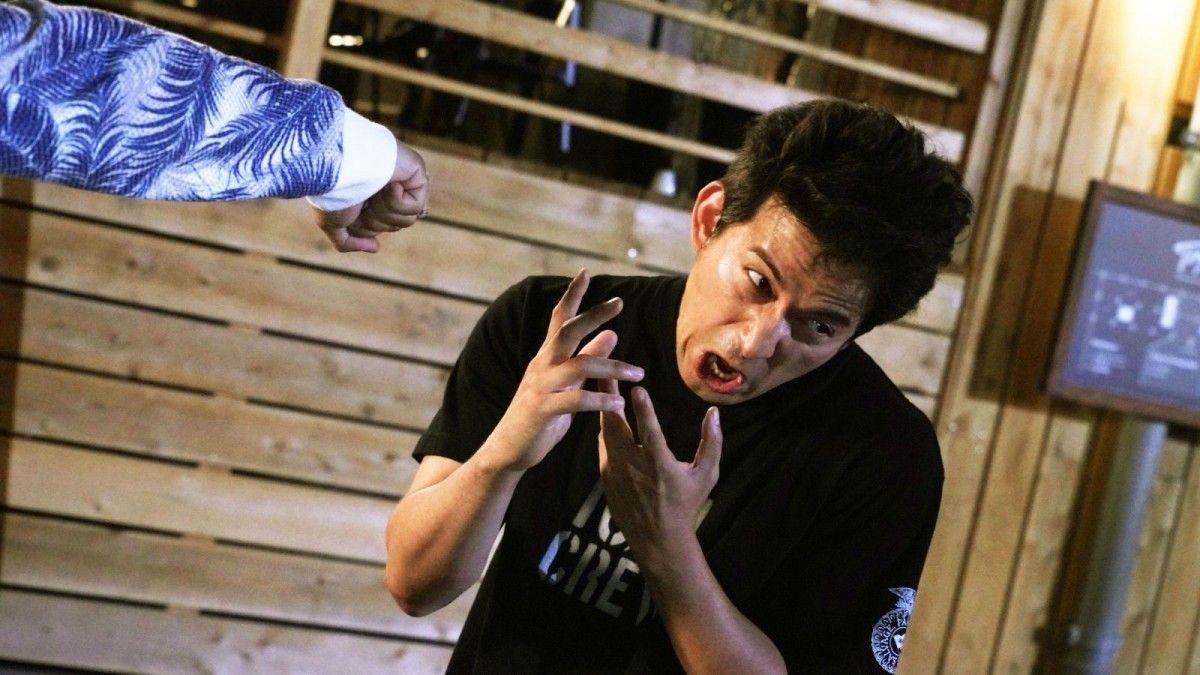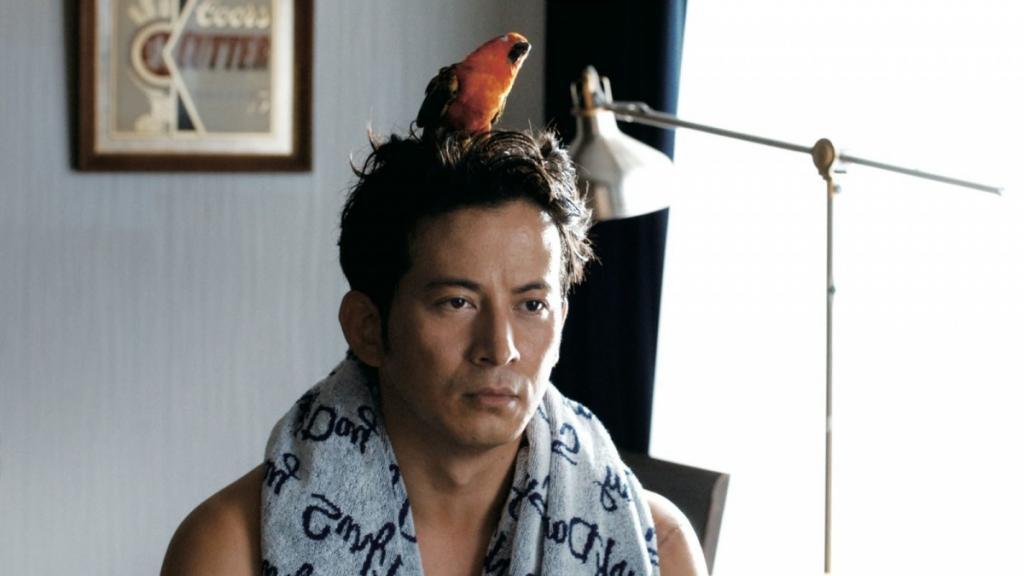
A formidable highlight for this year’s festival circuit, Kan Eguchi’s action comedy, The Fable, delivers a steady balance of the silly with purposeful action, story development, and palpable drama to boot. Clocking in at two hours and some change, it’s a sizeable enough template with actor Junichi Okada to absorb himself into a role layered enough to keep interesting during the film’s quieter moments.
Some action fans might take umbrage some at this given much of the oddball comedy sampled in the trailers thusfar; I do posit that a good, fair viewing would defintiely change some opinions for what the film delivers during its runtime. Concordantly, you get a performance from Okada that further stipulates his gravitas as an actor – particularly one who happens to be skilled in martial arts himself, and it definitely shows.
Eguchi’s The Fable takes its cues from Katsuhisa Minami’s 2014 manga of the same name, adapted for the screen accordingly by Yusuke Watanabe whose credits also include Yu Irie’s novel adaptation, Joker Game, and Shinji Higuchi’s live-action Attack On Titan films. We follow Eguchi’s take on The Fable with an opening action scene that starts with a slow brew and doesn’t hesitate too long before spilling a few ounces of blood. Peppered with flurries of graphics to highlight our assassin’s kill method, the scene is a real wake-you-up moment that lets you know just what to expect as far as the action goes – it’s not Deadpool-gory but spills enough of the red stuff to whet the appetite.
Soon after, our killer and his partner, Yoko (Fumino Kimura) reconvene with his employer (Koichi Sato). They’re reassigned new identities as siblings with the “Fable” given the name, Akira, along with a pet parakeet, and a residency in Osaka for a year to lay low from their activity, but with a catch: Akira is not allowed to kill anyone, or else he’ll meet his end with a bullet himself. Akira and Yoko meet up with the boss’s firm whose lieutenant, Ebihara (Ken Yasuda), who not only oversees Akira’s and Yoko’s transition into a quiet, idyllic life, but also takes it upon himself to try and apply Akira’s talents to his own ends – which would ultimately violate Akira’s deal.
Despite his visibly peculiar behavior, he’s able to adapt and play the role well enough to convince his newfound peers, including Misaki (Mizuki Yamamoto) who goes out of her way to help her new neighbor find employment at the company where she works. Meanwhile, much is ado with the criminal underpinnings at Ebihara’s yakuza firm where he reunites with his ex-con brother, Kojima (Yuya Yagira) after an early release from an eight-year stint in prison, and the overzealous Sunagawa (Osamu Mukai) is quietly drawing big plans of his own to overthrow the firm’s leadership.
All throughout this exposition is the underlying rumor that the notorious killer himself, “The Fable”, is hiding out in-cognito at the boss’s behest. Despite the “Fable”‘s recent killing spell caught on video, some fear him while others deny his very existence; Far be it for Fudo (Sota Fukushi), a contract killer hungry for his own glory to tamp down his fascination and excitement, he’s staunch believer in the Fable and will do whatever it takes to expose, eliminate and replace him.
Okada’s often blank-faced performance lends feasibly to highlight his character’s mild stoicism and occasional eccentricities; Akira’s enjoyment of a cheesy comedy program coalesces moments of sardonic humor relative to a side of his personality he rarely shows publicly, particularly in his current pursuits of a normal life. Moreover, even this aspect of the story takes a interesting turn when our protagonist is confronted by Ebihara at gunpoint and asks him what life really means. It’s a pivotal point of evolution for Akira as the plot develops further with his burgeoning romantic interest in Misaki.
The crux of the story eventually starts to come full circle when Kojima’s rivalry hits a boiling point as Misaki is suddenly caught in the middle, forcing Akira and Yoko to spring action. Guns blaze with with the sheer spectacle of a John Woo-stylized shootout and host to the elusive “Fable” himself laying waste to Sunagawa’s men, followed by some brilliant misdirection thanks to some nimble writing and cinematography that brings Eguchi’s stellar manga treatment to a suitable close.
Akira’s quirks and uncanny traits exhibited in Okada’s performance are far from distracting, fitting of a unique character that doesn’t sell himself short as a man whose conditional getaway turns into something a little more personal. It goes hand-in-hand with Okada’s ability to make the character work aside from the film’s CQC-style action and gun fu, and with Kimura’s purposefully uncouth Yoko whose more prominent schtick involves the employment of using drunken stupor to distract enemies they’re trying to infiltrate. Fumina’s Yoko does get at least one scene to show how tough she, and that’s really all there is on the female end of the action.
Fukushi’s Fudo stands out certainly as one of the more memorable roles in the film following up titles like Bleach and Blade Of The Immortal. His action sequences in the third act with Okada make for an ample sweetner amid the action and fight scenery with choreography by members of the Jackie Chan stunt team and with Alain Figlarz. Competent cinematography adds to the enjoyment of the action on top of the kind of steady editing that so often falls short of some filmmakers today, even with a few recent Hollywood successes.
I particualrly enjoyed some of the pacing in the film’s dialogue and editing. The beats between the comedy and drama speak greatly to the kind of rhythm that’s so prevalent in some of Edgar Wright’s work, and additionally, what I wish I saw in Yuichi Fukuda’s Gintama in 2017, which was still a treat nonetheless.
My only real grievance is a tiny one involving Yamamoto’s Misaki role in the third act. It’s a precursor to Yoko’s aforementioned minimal badass moment (again, something I would have loved to watch on a slightly greater scale) and pretty habitual a thing to see in some movies, and it irks me a little to see it happen. At any rate, that didn’t ruin my enjoyment of the film or the performances therein. Eguchi had the right team on his hands with The Fable, a project that lends foremost credibility to Okada as a versatile action star – one who chiefly doesn’t need be pigeonholed into a single genre to appease fans.
It’s further proof that when done right, adaptations can be fun, enthralling and entertaining, and won’t generate the type of controversy and toxicity that’s so easy to fall into as demanding and uncouth as some movie goers typically tend to be. The Fable is a smartly-written, energetic and thrilling hitman comedy that hits its mark everytime, and I for one, would welcome more of this.

